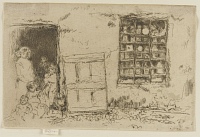Etchings Institutions search term: grolier club
The Village Sweet Shop | ||
| Number: | 266 | |
| Date: | 1886 | |
| Medium: | etching | |
| Size: | 82 x 124 mm | |
| Signed: | butterfly at right | |
| Inscribed: | no | |
| Set/Publication: | no | |
| No. of States: | 1 | |
| Known impressions: | 14 | |
| Catalogues: | K.251; M.247; W.205 | |
| Impressions taken from this plate (14) | ||
TECHNIQUE
This plate was executed in pure etching. Whistler may have brushed acid over some areas to produce textured effects. He certainly manipulated foul biting on the wooden shutter to right of the doorway by removing it from individual panels and burnishing those areas to create subtle highlights. This is most notable on the top centre panel of the shutter.
PRINTING
All known impressions were printed in dark brown ink on laid paper in shades ranging from ivory (i.e.  ) to cream and buff. Some have watermarks, such as a possible Strasbourg Lily (
) to cream and buff. Some have watermarks, such as a possible Strasbourg Lily ( ), Pro Patria on a sheet taken from an old ledger (
), Pro Patria on a sheet taken from an old ledger ( ), and a shield (
), and a shield ( ). Another impression, on off-white laid paper, also seems to have been taken from an old book and has a pen inscription on the verso (
). Another impression, on off-white laid paper, also seems to have been taken from an old book and has a pen inscription on the verso ( ). All are trimmed to the platemark and one (
). All are trimmed to the platemark and one ( ) well within the platemark. All are signed on the tab with a butterfly, which can be dated to 1886 or 1887.
) well within the platemark. All are signed on the tab with a butterfly, which can be dated to 1886 or 1887.
 ) to cream and buff. Some have watermarks, such as a possible Strasbourg Lily (
) to cream and buff. Some have watermarks, such as a possible Strasbourg Lily ( ), Pro Patria on a sheet taken from an old ledger (
), Pro Patria on a sheet taken from an old ledger ( ), and a shield (
), and a shield ( ). Another impression, on off-white laid paper, also seems to have been taken from an old book and has a pen inscription on the verso (
). Another impression, on off-white laid paper, also seems to have been taken from an old book and has a pen inscription on the verso ( ). All are trimmed to the platemark and one (
). All are trimmed to the platemark and one ( ) well within the platemark. All are signed on the tab with a butterfly, which can be dated to 1886 or 1887.
) well within the platemark. All are signed on the tab with a butterfly, which can be dated to 1886 or 1887.Messrs Dowdeswell, London art dealers, after consulting the newly published catalogue by Frederick Wedmore (1844-1921), requested impressions of a number of etchings in February 1887 including Wedmore's '205'. 14 By 8 February Whistler was at work printing the copper plates to satisfy their order. He sold three impressions to Messrs Dowdeswell in July, and on 4 September 1887 he recorded printing eight more impressions of 'Sweet Shop'. 15 It is impossible to distinguish between the earliest and later impressions, but all seem to have been done within just over a year.
